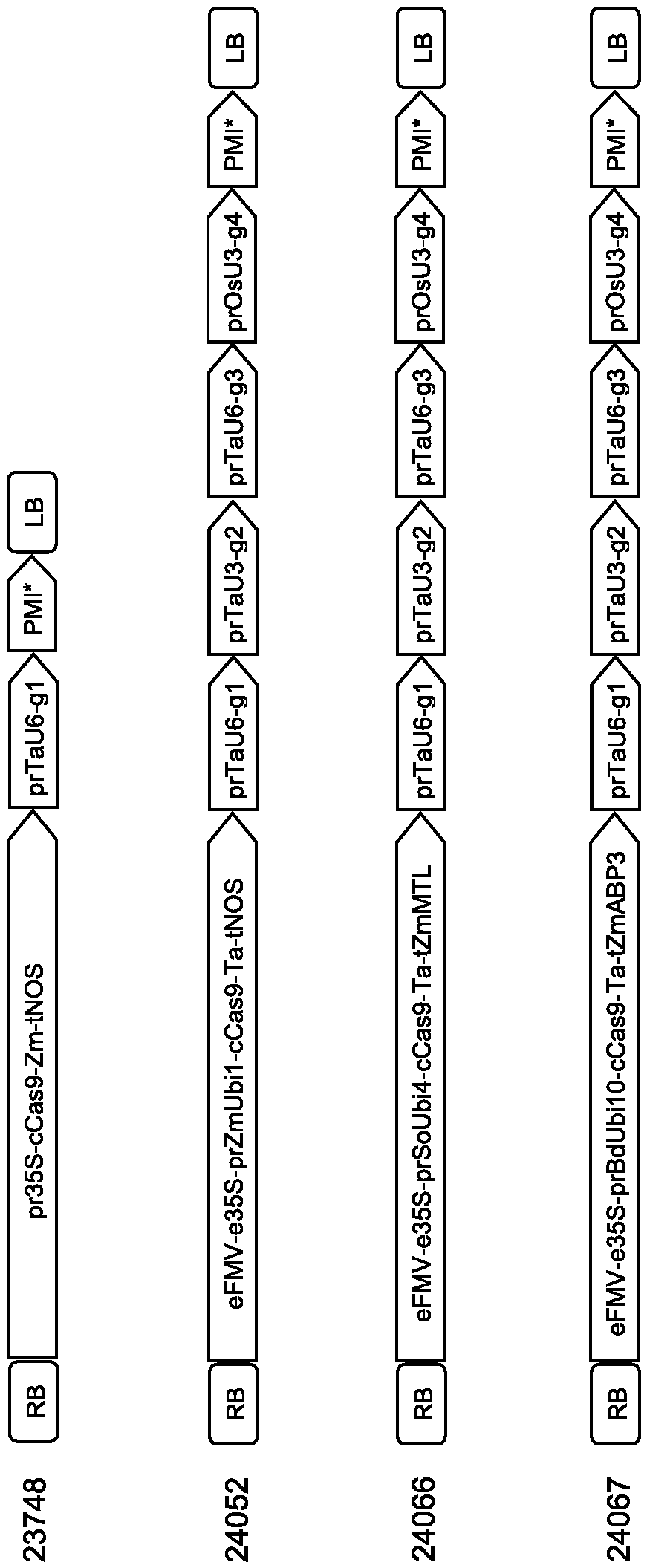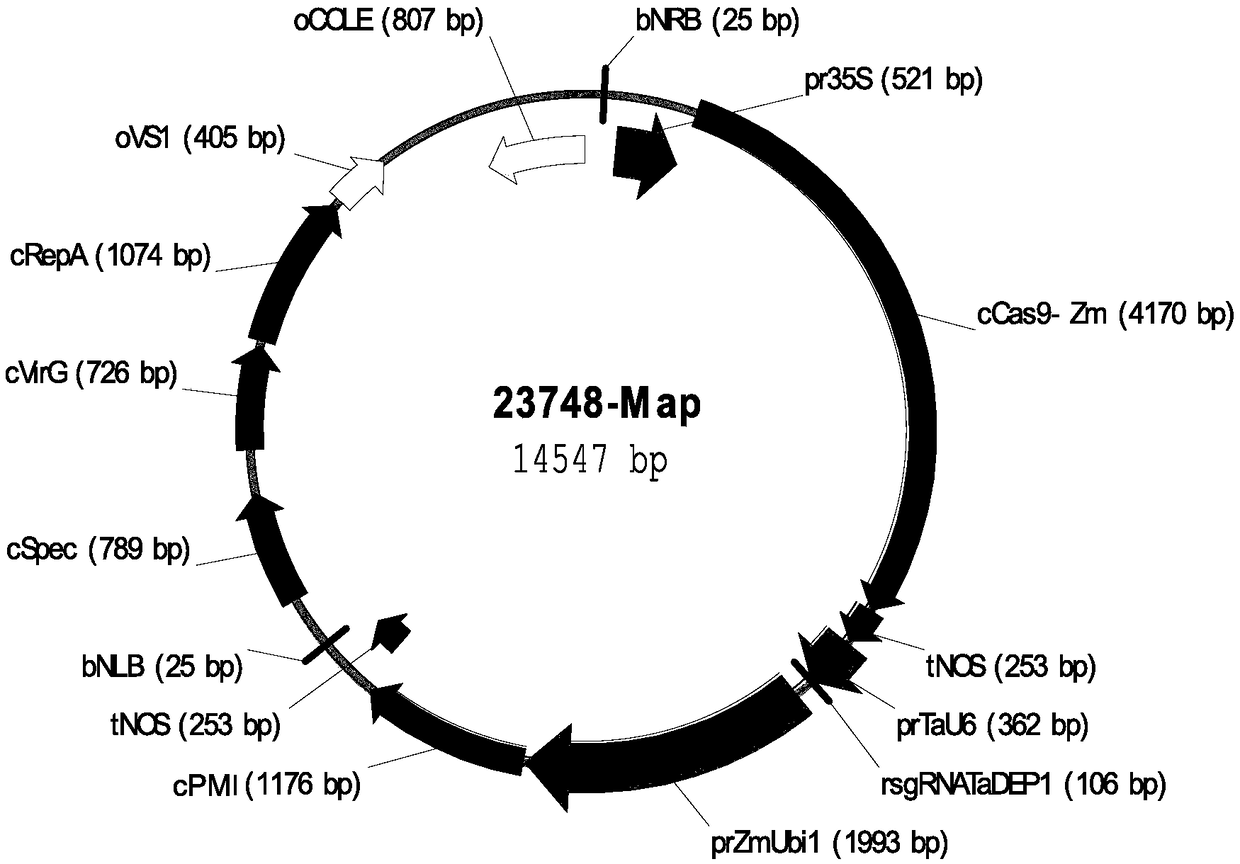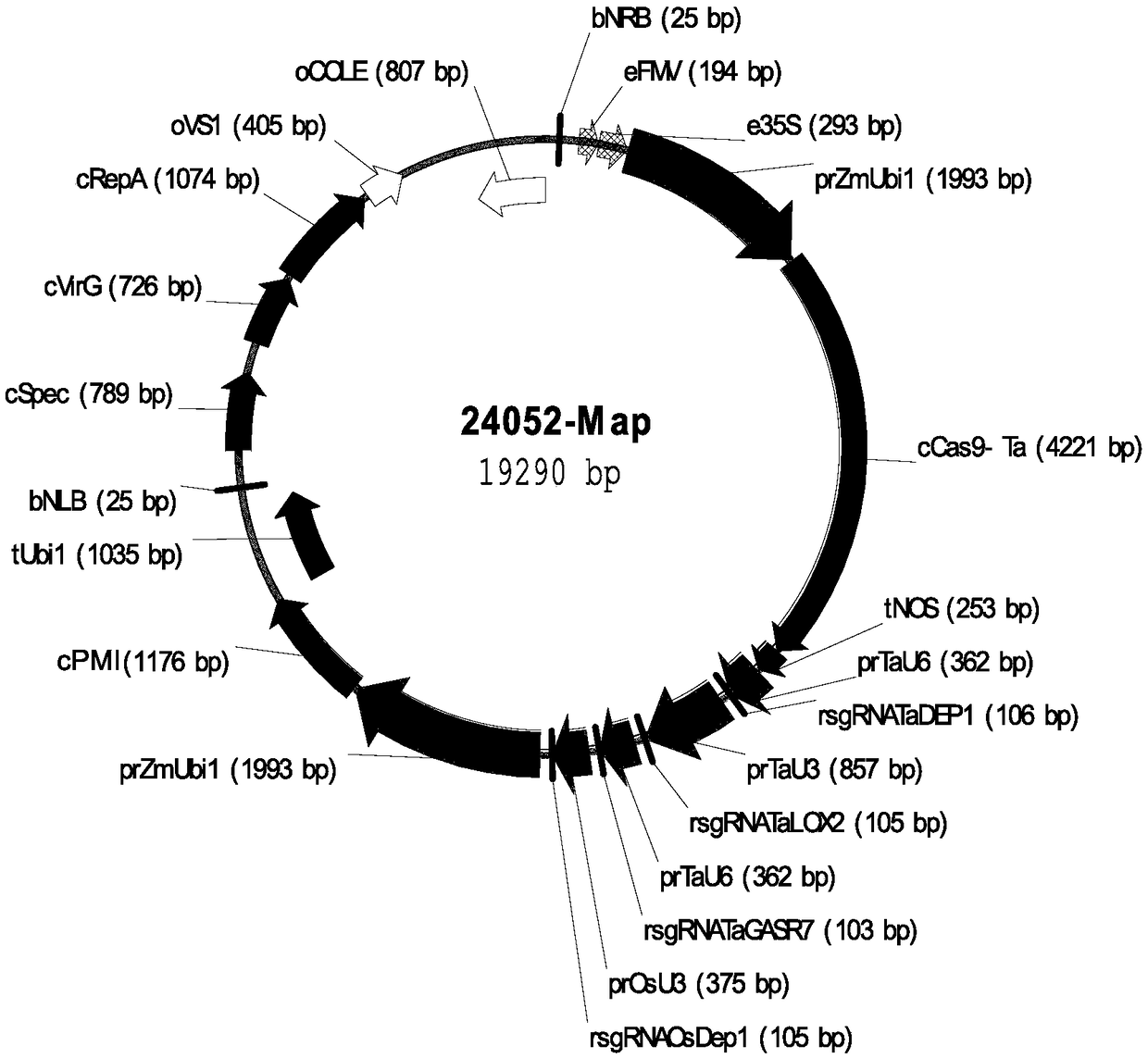Method for optimizing wheat gene editing efficiency
A wheat and gene technology, applied in the field of gene editing, can solve the problems of low editing efficiency, unstable vector, unsatisfactory gene editing efficiency, etc.
Inactive Publication Date: 2019-01-04
SYNGENTA PARTICIATIONS AG +1
View PDF6 Cites 1 Cited by
- Summary
- Abstract
- Description
- Claims
- Application Information
AI Technical Summary
Problems solved by technology
In the study of low-gluten wheat, CRISPR / Cas9 was used to carry out fragment deletion mutations on the corresponding genes, and 21 transgenic T0 plants were obtained. The results of gene mutations in the T0 generation plants were not reported, but the target gene was carried out in the T1 generation plants. mutation analysis [23] , which may be related to the low editing efficiency in wheat
[0006] In addition, in all the articles edited on wheat that we have reviewed so far, the sgRNA is driven by the wheat endogenous TaU6 promoter, and there is no report using the wheat endogenous TaU3 promoter; the Cas9 gene used 35S in early articles Promoter-driven, most recent articles are driven by the maize ZmUbi promoter, this change is mainly due to the more stable and efficient expression of the maize ZmUbi promoter in wheat immature embryos
Yet gene editing efficiency remains unsatisfactory
[0007] Compared with other monocotyledonous crops maize and rice, the editing efficiency of CRISPR / Cas9 system in wheat is low, and the editing efficiency needs to be further improved; so far, there is no report of using the promoter of wheat U3 to drive sgRNA for gene editing, and it is necessary to Assess the activity of sgRNA expressed by the wheat U3 promoter, so that in the design of multi-site edited sgRNA, more choices can be made to reduce the risk of vector instability caused by using the same promoter multiple times on the same vector
Method used
the structure of the environmentally friendly knitted fabric provided by the present invention; figure 2 Flow chart of the yarn wrapping machine for environmentally friendly knitted fabrics and storage devices; image 3 Is the parameter map of the yarn covering machine
View moreImage
Smart Image Click on the blue labels to locate them in the text.
Smart ImageViewing Examples
Examples
Experimental program
Comparison scheme
Effect test
Embodiment 1
[0041] Example 1. Construction of optimized binary vector and verification of its editing efficiency in wheat
[0042] 1. Materials and methods
[0043] 1.1. Binary vector construction
the structure of the environmentally friendly knitted fabric provided by the present invention; figure 2 Flow chart of the yarn wrapping machine for environmentally friendly knitted fabrics and storage devices; image 3 Is the parameter map of the yarn covering machine
Login to View More PUM
 Login to View More
Login to View More Abstract
Description
Technical field [0001] This application relates to the field of gene editing, particularly to gene editing in wheat. This application improves the efficiency of gene editing in wheat. Background technique [0002] Wheat is the world's main food crop and has an important economic position. From the analysis of chromosomes and genome, wheat has more complex characteristics than crops such as corn and rice. First, wheat is an allohexaploid and has three sets of genomes (AABBDD); second, the wheat genome is about 17Gb. Both maize and rice are diploid (AA), and their genomes are much smaller than those of wheat. The maize genome is 2.5Gb and the rice genome is only 430Mb. At the same time, the wheat genome has more repetitive sequences and transposable originals. These characteristics increase the difficulty of wheat genome improvement to a certain extent [1] . [0003] Clustered regularly spaced short Palindromic Repeats and its related system (CRISPR / Cas system, Clustered Regular...
Claims
the structure of the environmentally friendly knitted fabric provided by the present invention; figure 2 Flow chart of the yarn wrapping machine for environmentally friendly knitted fabrics and storage devices; image 3 Is the parameter map of the yarn covering machine
Login to View More Application Information
Patent Timeline
 Login to View More
Login to View More Patent Type & Authority Applications(China)
IPC IPC(8): C12N15/82C12N15/113C12N1/21C12N5/10C12R1/01
CPCC12N15/113C12N15/8213C12N2310/10C12N2310/20
Inventor 耿立召许建平
Owner SYNGENTA PARTICIATIONS AG
Features
- R&D
- Intellectual Property
- Life Sciences
- Materials
- Tech Scout
Why Patsnap Eureka
- Unparalleled Data Quality
- Higher Quality Content
- 60% Fewer Hallucinations
Social media
Patsnap Eureka Blog
Learn More Browse by: Latest US Patents, China's latest patents, Technical Efficacy Thesaurus, Application Domain, Technology Topic, Popular Technical Reports.
© 2025 PatSnap. All rights reserved.Legal|Privacy policy|Modern Slavery Act Transparency Statement|Sitemap|About US| Contact US: help@patsnap.com



